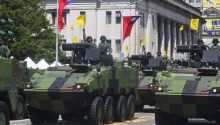by Finian Cunningham, Strategic Culture:

Ever since China’s civil war ended in 1949 with victory for the Communist side, the island of Taiwan off China’s southern coast has been a U.S. pawn as a haven for anti-Communist forces. The United States has sponsored the Taiwanese separatists first under the dictatorship of Chiang Kai-shek and up to the present administration in Taipei. Ironically, Washington portrays Taiwan as “democratic and free”.
TRUTH LIVES on at https://sgtreport.tv/
Washington’s support for Taiwan waned in 1979 when the U.S. endeavored to normalize relations with Beijing under the so-called One China Policy which defines Taiwan as under the sovereign control of the People’s Republic of China. The U.S. position conforms to the international norm of recognizing China as one sovereign nation in which Taiwan is but an island province.
The U.S.’s so-called normalization of relations with China was not genuine. It was a geopolitical move to wedge relations between Beijing and Moscow. Now that China and Russia have reestablished strategic connections under Presidents Xi and Putin, the U.S. has reverted to overt hostility towards China and its policy of using Taiwan as a cat’s paw to destabilize the mainland.
After the Obama administration embarked on its Pivot for Asia strategy in 2011, Washington earnestly reinstated relations with Taiwan in such a way as to deliberately provoke Beijing and undermine its sovereignty.
Tensions over Taiwan have become increasingly fraught as the United States steps up military supplies to the island territory. The weapons systems have become increasingly offensive in their capability of attacking China’s mainland. This development not only undermines China’s sovereign authority. It also poses an overt national security threat to Beijing. Taiwan is a mere 130 kilometers (80 miles) from the Chinese mainland across a narrow sea called Taiwan Strait.
This places China in an acute dilemma. Should it take preemptive military action or wait it out until politics takes its course?
A recent election in Taiwan was won by a pro-independence party. But there was a greater combined vote for parties that want more friendly relations with mainland China. That strongly suggests that Taiwanese people are against a military confrontation and are amenable to political reconciliation as proposed by Beijing. Perhaps over time, the Taiwanese population may develop a decisive majority that desires peaceful reunification.
The problem is the United States has control of the initiative to inflame tensions with China. In that case, Beijing might eventually be drawn into a military confrontation despite its aspirations.
The Return of Great Power Competition
Since the supposed end of the Cold War in 1991 following the collapse of the Soviet Union, for most of the ensuing three-decade period, the United States declared its main national security concerns to revolve around international terrorism. In recent years, however, the U.S. has relegated the perceived threat of terrorism and officially prioritized its strategic concerns about “great power competition”.
Russia and China have been labeled the top geopolitical rivals for U.S. global power. In this way, there has been a return in Washington to the Cold War geopolitics and rhetoric that dominated international relations during the five decades after World War Two. While Moscow and Beijing have both repudiated adversarial relations and have repeatedly urged peaceful coexistence in a multipolar world, the United States has relentlessly sought to depict the so-called “global rules-based order” as being threatened by Russia and China.
Read More @ Strategic-Culture.org



